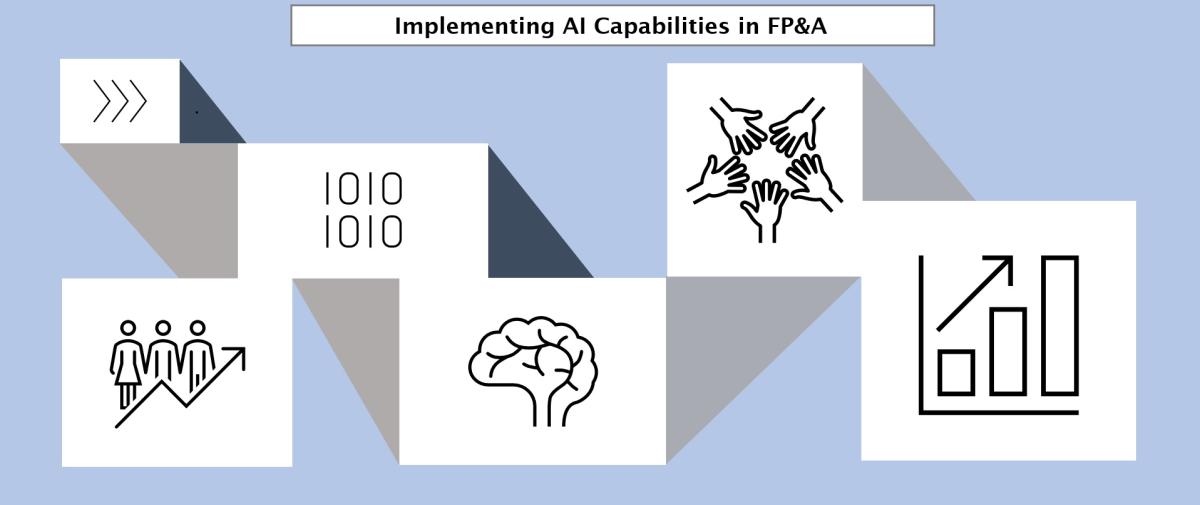Without a doubt, the effects of AI on the global economy are jaw-dropping. But how does...
As a Financial Planning and Analysis (FP&A) experienced professional, I understand the importance of using technology to automate business processes, particularly those related to financial planning and analysis. Today, businesses are embracing technology more than ever before, and as a result, automation is becoming a critical component in the success of any business.

Figure 1
Artificial Intelligence (AI) has the potential to revolutionise the FP&A function, enabling faster, more accurate decision-making and providing valuable insights that can inform Strategic Planning. However, the implementation of AI capabilities in FP&A can be a complex and challenging process. From my experience, below are some key aspects to consider when implementing AI capabilities in FP&A to increase your chances of success:
1. Define clear business objectives
Before implementing any AI capabilities, it is important to clearly define the business objectives and specify the problem your company intends to solve. By defining these objectives, you can ensure that the implementation of AI capabilities is aligned with the overall business strategy and provides tangible benefits to the organisation.
2. Create a clear development roadmap
Developing a clear roadmap is essential to ensure that the implementation of AI capabilities is executed effectively. The roadmap should identify the key stages of the implementation process, including data preparation, model development, testing, and deployment. It should also clearly outline the resources and timelines required for each stage and identify any potential risks or challenges that may arise.
3. Focus on financial and non-financial data quality
The success of AI capabilities in FP&A depends on the quality and consistency of the data being used. Therefore, investing in data quality management, including data cleansing and validation, is important to ensure the data is accurate and reliable. This will enable the AI models to provide accurate insights and recommendations and avoid potential errors or biases.
4. Invest in the right technology
Many AI technologies are available in the market, and it is important to select the right technology that best meets your organisation's needs. When evaluating different AI technologies, it is important to consider factors such as ease of use, scalability, flexibility, and cost-effectiveness. Additionally, it is important to ensure that the technology is compatible with your existing IT infrastructure and systems.
5. Develop a strong and diverse talent pool
Implementing AI capabilities requires a team with a unique skill set combining technical and financial expertise. Therefore, it is important to invest in developing a strong talent pool with the necessary skills to develop, implement, and maintain AI capabilities. This may include data scientists, software engineers, and financial analysts with experience in data modelling and analysis.
6. Ensure stakeholder engagement
Furthermore, any AI applications require the support and engagement of all stakeholders, including business leaders, financial analysts, and IT teams. Hence, it is important to ensure that all stakeholders are engaged and invested in the success of the AI capabilities. This may include regular communication and training to ensure that all stakeholders understand the benefits of AI and are equipped to leverage it effectively.
7. Regularly monitor and evaluate the performance of AI capabilities in use
Once AI capabilities are implemented, it is important to monitor and evaluate their performance regularly. This includes tracking key performance indicators (KPIs) such as accuracy, speed, and efficiency. It is also important to solicit feedback from stakeholders to identify any areas for improvement and to refine the AI capabilities over time to ensure they continue to deliver value to the organisation.
Conclusion
Implementing AI capabilities in FP&A can benefit organisations significantly, including faster, more accurate decision-making and valuable insights that can inform strategic planning.
To increase your chances of success, it is important to:
- define clear business objectives,
- develop a clear roadmap,
- focus on data quality,
- invest in the right technology,
- develop a strong talent pool,
- ensure stakeholder engagement,
- and regularly monitor and evaluate performance.
By following these key factors, organisations can successfully implement AI capabilities in FP&A and gain a competitive advantage in the marketplace.
Subscribe to
FP&A Trends Digest

We will regularly update you on the latest trends and developments in FP&A. Take the opportunity to have articles written by finance thought leaders delivered directly to your inbox; watch compelling webinars; connect with like-minded professionals; and become a part of our global community.





